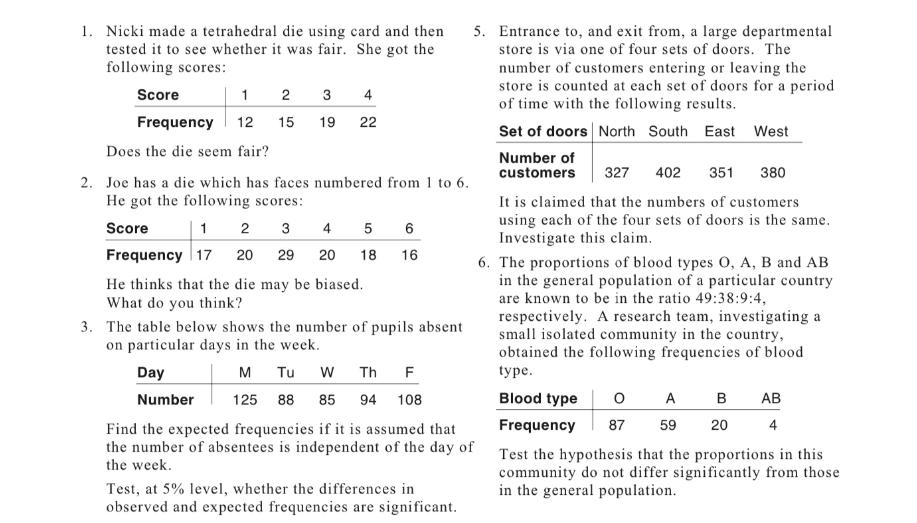Answered step by step
Verified Expert Solution
Question
1 Approved Answer
1. Nicki made a tetrahedral die using card and then tested it to see whether it was fair. She got the following scores: Score


1. Nicki made a tetrahedral die using card and then tested it to see whether it was fair. She got the following scores: Score Frequency Does the die seem fair? 4 19 22 1 2 3 12 15 2. Joe has a die which has faces numbered from 1 to 6. He got the following scores: Score 1 2 3 4 5 Frequency 17 20 29 20 18 He thinks that the die may be biased. What do you think? 6 16 5. Entrance to, and exit from, a large departmental store is via one of four sets of doors. The number of customers entering or leaving the store is counted at each set of doors for a period of time with the following results. Set of doors North South East West Number of customers 3. The table below shows the number of pupils absent on particular days in the week. M Tu W Th F Day Number 125 88 85 94 108 Find the expected frequencies if it is assumed that the number of absentees is independent of the day of the week. Test, at 5% level, whether the differences in observed and expected frequencies are significant. 327 402 351 380 It is claimed that the numbers of customers using each of the four sets of doors is the same. Investigate this claim. 6. The proportions of blood types O, A, B and AB in the general population of a particular country are known to be in the ratio 49:38:9:4, respectively. A research team, investigating a small isolated community in the country, obtained the following frequencies of blood type. A Blood type 0 Frequency 87 59 Test the hypothesis that the proportions in this community do not differ significantly from those in the general population. B 20 AB 4 4. Over a long period of time, a research team monitored the number of car accidents which occurred in a particular county. The following table summarises the data relating to the day of the week on which the accident occurred. Day M Tu W Th F S Su Number of accidents 60 54 48 53 53 75 77 Investigate the hypothesis that these data are a random sample from a uniform distribution. (AEB)
Step by Step Solution
There are 3 Steps involved in it
Step: 1

Get Instant Access to Expert-Tailored Solutions
See step-by-step solutions with expert insights and AI powered tools for academic success
Step: 2

Step: 3

Ace Your Homework with AI
Get the answers you need in no time with our AI-driven, step-by-step assistance
Get Started


